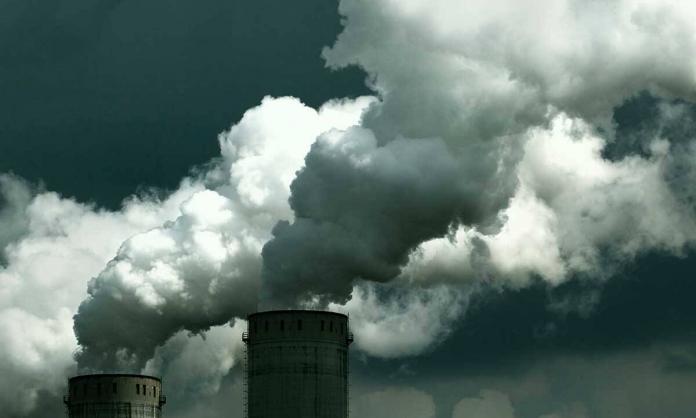The whole country is talking about Labor’s Climate Change Bill. But there’s nothing there.
It’s hard to get across just how sparse the actual provisions of the legislation are. The entire content of the bill can be explained in one sentence: the government reports to parliament every year on what progress has been made towards an emissions reduction target, initially 43 percent.
That’s it.
There’s no enforcement mechanism. If the government reports are nonsense, or announce that there has been no progress, or that there has been movement away from the target, nothing happens. And there’s not a single concrete measure in Labor’s Bill that will stop a single molecule of CO2 or methane from being emitted.
Climate activists in Britain recently won a case in that country’s High Court. The UK government was found to be violating the Climate Change Act, because the act’s legally binding carbon emissions target wasn’t going to be met. The UK government might have to adjust its climate policies somewhat.
Even this very limited degree of accountability is impossible under the law passed in Australia’s lower house of parliament last week. The government is not obliged to meet a carbon budget, or even to plan to meet a carbon budget. It just has to report. So long as the government dutifully reports—even if it reports total bullshit—the law is being followed.
And yet, liberal opinion went into raptures as soon as the Greens announced that they would vote for the legislation. “The climate wars are nearly over”, declared the independent MP for North Sydney, Zali Steggall.
Wrong. If we understand the “climate wars” as the bipartisan war of both Liberal and Labor against the measures necessary to achieve a safe climate, the climate wars are continuing unabated.
In fact, Australia’s already colossal carbon footprint is set to increase through a string of major fossil fuel export projects, especially the Scarborough project in Western Australia and the Beetaloo fracking project in the Northern Territory. As the Greens have highlighted, there is nothing in Labor’s Climate Change Bill, or elsewhere in Labor’s policies, that even starts to address this disastrous expansion in fossil fuels.
Labor’s Climate Change Bill is only one part of its climate policies. But the feeble 43 percent reduction target, and the lack of any enforcement mechanism, are entirely in keeping with Labor’s priorities.
Ketan Joshi is one of the sharpest analysts of Australian climate policy. In a thoughtful analysis of Labor’s policies, Joshi notes the continuities between Liberal and Labor:
“There is true, solid bipartisanship between the two major parties at the moment—both are equally committed to doing nowhere near enough on domestic emissions, and nothing but a worsening of exported fossil emissions through the expansion of coal and gas mining.”
In a more recent analysis, Joshi found Labor’s climate policy to be 3 percent “putting the fire out” by decreasing domestic emissions, and 97 percent “pouring petrol on it” by allowing massive new fossil fuel export projects.
Labor’s Climate Change Bill contains none of the “3 percent” mitigation measures and stops none of the “97 percent” expansion of fossil fuels. In terms of achieving a safer climate, its effect will be zero. But it’s crucial politically. The Climate Change Bill’s purpose, according to the explanatory memorandum, is “signalling the direction of travel”. If you wanted to be less generous, but no less accurate, you could rephrase the legislation’s intent as “aspirational”. Or “symbolic”. Or “greenwashing”.
Distinguishing meaningful action on climate from its imitators—tinkering at the edges or entirely “aspirational” greenwashing like Labor’s Climate Change Bill—is a crucial task. For proof, just look at Germany. The brutal fact is that, after decades of praise heaped on the country’s supposed “transition”, solar and wind contribute just 5.2 percent of the country’s total energy supply. Germany’s “transition” is largely bullshit, a “transition” from one fossil fuel to another. The disruption to Russian gas supplies has now demonstrated this point to the whole world.
None of us can afford this sort of make-believe around climate policies. Instead, we need a brutal level of honesty.
A reasonable minimum threshold to consider support for climate legislation might be that the legislation actually does something to address the climate crisis. Labor’s climate bill fails even this most basic test.
The Greens justified their vote for the legislation by pointing to a series of alleged improvements. None of them stack up.
For instance, the Greens claim that the legislation has been “Dutton-proofed” by ensuring that the 43 percent reduction figure can only be increased, not decreased. This is hollow when any future Dutton government is under zero legal obligation to meet the 43 percent target—or any higher target, for that matter.
The Greens also claim that amendments accompanying the Climate Change Bill will “make it harder” for government bodies such as the Northern Australia Infrastructure Fund to provide finance for fossil fuel projects. This is not the case. There is nothing in the Climate Change Bill or the “consequential amendments” accompanying the legislation that says this.
For example, the “consequential amendment” to the Northern Australian Infrastructure Facility Act is of very little consequence. The amendment will add “achievement of Australia’s greenhouse gas emissions reduction targets” to the long list of permissible uses for the money provided by the fund. There is no mandate for emission reduction targets to be considered, much less a prohibition on new high-emission projects.
The Greens claim that the government will “consider” proposals to funnel extra money into coal communities during any transition, but there is zero trace of any initiative like this in the bill that was passed.
This and other essentially meaningless or non-existent “improvements” look like a justification after the fact.
More plausible is that the Greens—beset by false allegations that they had consigned Australia to a decade of climate inaction, and facing a tide of liberal wishful thinking about the end to the political unpleasantness of the so-called climate wars—simply didn’t see the upside in standing their ground on this occasion, by opposing a piece of legislation that was basically “signalling the direction of travel”, aka greenwashing.
As party leader Adam Bandt has observed, this is only round one. But a crucial part of the fight, in the term of this parliament and beyond, will be distinguishing actual climate action versus larger or smaller scale greenwashing. Voting for a Climate Change Bill that does nothing to slow the heating of the planet—and which in fact offers cover for its more rapid destruction—is pointing in exactly the wrong direction.
Labor’s Climate Change Bill amounts to: keep stacking up the cash while the planet burns. That’s why Australia’s business elite have applauded passage of the law. The Australian Financial Review reports that an Origin Energy spokeswoman “welcomed the Greens decision” to back the bill.
Stubborn resistance in the face of wishful thinking and greenwashing of various shades, not going with the flow, is what we need if we are to address the massive crisis unfolding before our eyes. That will not always be easy, or popular. But it’s the only course worth taking.









